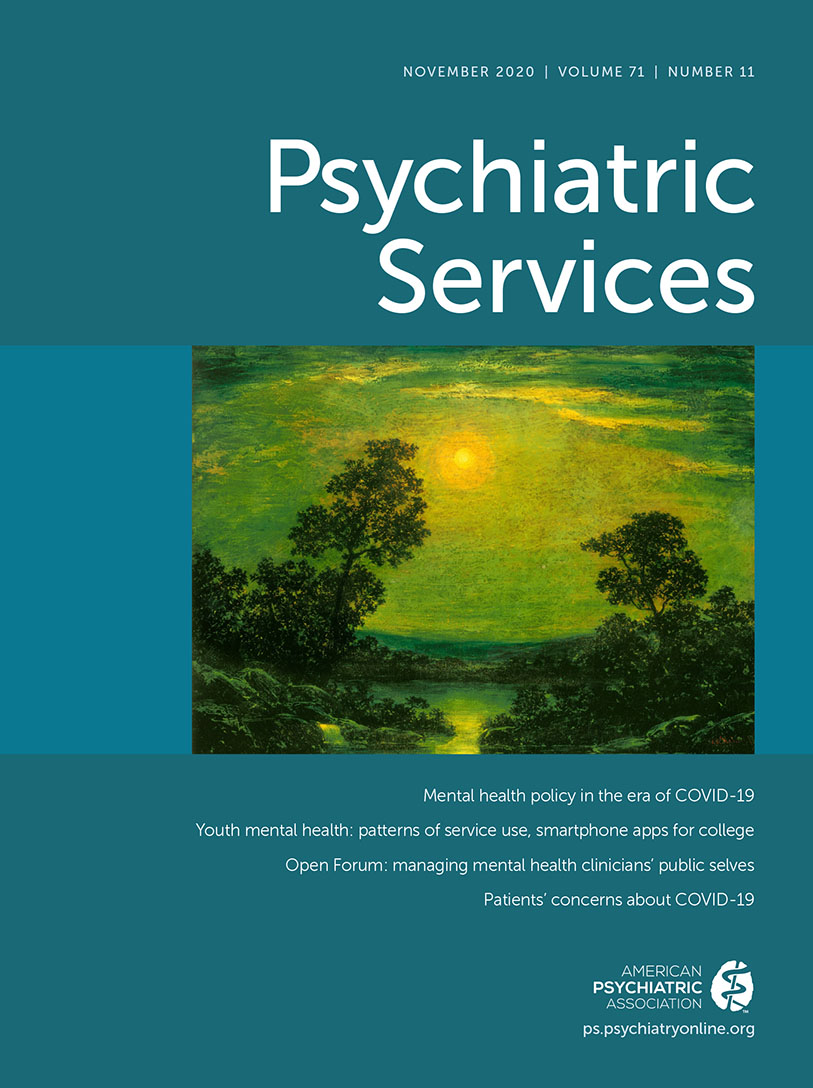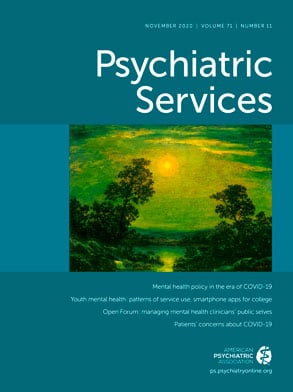Many psychiatrists may remain unaware of a profound current shift in psychiatric research funding and of its consequences for patients and the future of psychiatry. A core mission of the U.S. National Institutes of Health (NIH) is “to develop, maintain, and renew scientific human and physical resources that will ensure the Nation’s capability to prevent disease” (
https://ocr.od.nih.gov/clinical_research_training.html). An unparalleled resource, the NIH funds an array of studies, including basic science, clinical research, and services research. But the “maintain and renew” mission is falling short for psychiatric clinical research.
Unlike other NIH institutes, the National Institute of Mental Health (NIMH) has taken a straight and neural path. Since 2002, the NIMH has increasingly funded neuroscience at the expense of clinical and services research, putting all its eggs in one biologic basket, envisioning a breakthrough that may not arrive for decades. The NIMH budget is not transparent, and our queries about its priorities to NIMH representatives have been unavailing. But according to former NIMH Director Thomas Insel, in 2015, only 10% of NIMH research money was used to fund clinical trials research, roughly half of which—just 5.4% of the total—supported clinical research on psychotherapy.
Neuroscience has produced impressive discoveries about our most complex organ, revealing labyrinthine brain circuits in previously unimaginable detail. Yet an abyss still separates basic neuroscience brain exploration and actual treatment. Neuroscience has yielded scant clinical progress. Indeed, while asserting that “neuroimaging has long been the primary tool for understanding the biological basis of psychopathology,” a recent review article acknowledged that it has yet to yield sought-after biomarkers useful for clinical research (
1). Scientists have located psychopathological genes, but each contributes only minutely to complicated, heterogeneous illnesses. Given the brain’s staggering complexity—its 86 billion intricately interconnected neurons—groundbreaking discoveries likely lie far in the future. Recall the “Decade of the Brain,” which ended 20 years ago, yielding few clues to the causation of psychiatric disorders.
By almost exclusively funding neuroscience, the NIMH is ignoring treatment research on patients’ current needs. Unless a clinician demonstrates a brain mechanism, the NIMH will not fund his or her clinical treatment research. This policy is misguided because behavior is messy, a complex interaction of both nature and nurture, biology and environment. The brain is inconceivably complex; many psychiatric symptoms lack known brain receptors. How we feel—crucial subjective perceptions—is measurable with paper-and-pencil tests but does not necessarily link to genes, receptors, or neural circuits. Studying the effects of treating depressed parents on their children’s health (
2), for example, is clinically crucial, yet orthogonal to neuroimaging and genetic studies—hence no longer fundable by NIMH. Other NIH institutes recognize the importance the environment plays in illness, but although it is crucial to psychiatric illness, the NIMH ignores the role of the environment in illness. The NIMH portfolio has become nearly all neuroscience. In headlong pursuit of brain science, NIMH directors have dismissed the experiential, patient-focused humanism at psychiatry’s heart.
NIMH historically has supported most psychiatric treatment research. It has funded large clinical studies, such as the Sequenced Treatment Alternatives to Relieve Depression, the Systematic Treatment Enhancement Program for Bipolar Disorder, and the Clinical Antipsychotic Trials of Intervention Effectiveness, which provided broad tests of treatment algorithms among large patient samples. Thanks to past NIMH support, the field of psychiatry has developed manualized, testable psychotherapies and compared their therapeutic effects with one another and with those of medications to see which treatments work best for which patients with depression, panic, posttraumatic stress, and other disorders. Proven, reliable therapies consequently exist for patients with these often chronic, debilitating conditions. Yet no treatment benefits everyone, and for some patients, no available treatment has helped. The NIMH has shut down the treatment research pipeline, not just for psychotherapies but also for comparative trials of pharmacotherapies, neuromodulation, and combined treatment studies. The NIMH essentially rejects clinical treatment research grant submissions unless they follow its Research Domain Criteria (RDoC), an alternative to clinical diagnosis that focuses on translational research. RDoC-based research explores phenomena such as “response to an acute threat” (i.e., fear) at various levels, from genes to neurotransmitter molecules, cells, brain circuits, physiology, and behavior. Treatment studies for people diagnosed as having conditions such as depression and posttraumatic stress disorder are essentially off limits unless they focus on such RDoC areas.
Yet the RDoC system presents problems. Its categories are no more “proven” than the putatively less biological polythetic diagnoses cataloged in the DSM and are far less clinically useful. They lend themselves to laboratory experiments, often with nonhuman animals and often having little immediate clinical connection. The “behavior” end of the translational research ladder is often an afterthought: connecting gene to neural circuit seems to suffice. Moreover, the yawning gap between clinical reality and the basic-science phenomenology of the RDoC means that most current NIMH-funded research has little immediate clinical value.
Some accomplished biological psychiatry researchers have criticized the RDoC for, among other things, having uncertain validity, not discriminating between normal variation and what constitutes pathology, ignoring the course of illness, and conflating different disorders on the basis of superficial similarities. Some scientists have suggested redistributing the resources “overinvested in RDoC” and confining the RDoC to a pilot program (
3).
Colleagues in other medical disciplines and in other countries are shocked to hear of NIMH’s extreme position. In many medical fields, the whole story of a disease (e.g., cancer) might seemingly reside in the body: for example, in understanding cancer genes, creating anticancer immune responses, and inventing chemotherapies. Yet the National Cancer Institute (NCI) wisely maintains a broader outlook, showing concern and funding psychotherapy research for the many patients with breast cancer who develop depression, which can massively affect disease outcomes (
4). Because the NIMH will not fund such research, psychiatric researchers like me (J.C.M.) have turned to the NCI. A survey of current NIH research funding has identified behavioral treatment studies in other NIH institutes: the NCI, the National Institute of Diabetes and Digestive and Kidney Diseases; the National Institute of Child Health and Human Development; the National Institute of Nursing Research; and the National Heart, Lung, and Blood Institute (in addition to the National Institute on Alcohol Abuse and Alcoholism and the National Institute on Drug Abuse).
One consequence of current NIMH policy is that crucial treatment research never takes place. It is as if NIMH thinks current therapies need no improvement. It simply is not true.
An even more ominous consequence is brain drain. Young psychiatrists and psychologists recognize that NIMH will not support clinical research careers. These early-career professionals instead tackle laboratory neuroscience, or, if their hearts and brains are clinically focused, they leave research for practice. In surveying psychiatric researchers, we are finding what we feared: plenty of junior faculty neuroscientists, but a dearth of clinical researchers. A research generation is being lost. The specialized technical knowledge of senior clinical researchers risks extinction. Researching psychotherapy requires manualizing therapies (defining focus, strategies, and techniques to use or to avoid), video recording of therapy sessions, and training evaluators in using adherence rating scales to rate randomly selected sample sessions. Analogous skills are required for pharmacotherapy trials. As a psychiatric journal editor, reviewer, research consultant, and mentor, I (J.C.M.) am dismayed at how quickly this knowledge is dwindling. Once gone, it will cost much time, money, and experience to reconstruct. Our recent research submission to NIH yielded reviews that highlight the loss of basic field knowledge: one reviewer asked that a comparative trial of psychotherapy and pharmacotherapy match treatments for therapist time, an unprecedented and clinically unrealistic demand.
As clinical researchers, we appreciate that
Psychiatric Services has focused on services research, which has not been equally affected by the RDoC mandate for clinical trials. Thus, many services researchers, even those working alongside us, may not fully appreciate the crippling effect NIMH policy has had on clinical research. We do not feel qualified to comment on the funding needs of services research beyond remarking that it has similarly suffered underfunding relative to neuroscience research. As one editorial gently put it: “Mental health research funding is a form of social investment. As with any investment portfolio, diversification is a prudent strategy” (
5). Funding in any medical scientific area should aim to improve public health, because the funds come from taxpayers’ dollars.
Now is not the calmest moment in the United States. Some government policies have put public mental health at risk. Our border policies traumatize separated children and their parents. The public appears to be panicking about and depressed by the COVID-19 pandemic and the government’s response to it. Political polarization is heightening U.S. anxiety levels. In this stressful environment, should not the NIMH support studying better treatments now, rather than banking on a remote future scientific breakthrough? Funding neuroscience should not mean eliminating research our patients need today.

